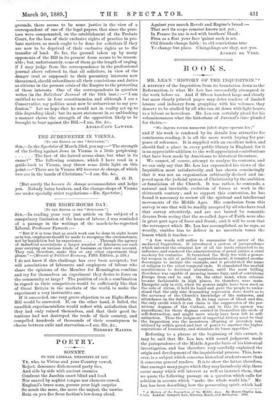THE EIGHT-HOURS DAY.
[TO THE EDITOR OP THE "SPECTATOR."] SIR,—In reading your very just article on the subject of a
-compulsory limitation of the hours of labour, I was reminded of a passage in the writings of the much-to-be-regretted Liberal, Professor Fawcett :-
" But if it is true that as much work can be done in eight hours :as in ten, employers should be made to recognise the circumstance, not by legislation but by experience Through the agency -of industrial associations a larger number of labourers are each year carrying on various kinds of business on their own account. They can, therefore, make this or any other experiment they please."—(Manual of Political Economy, Fifth Edition, p. 226.)
I do not know if this challenge has ever been accepted ; but will associations of labourers and employers of labour who
share the opinions of the Member for Kennington combine and try for themselves an experiment they desire to force on the community at large? The position of such a combination in regard to their competitors would be sufficiently like that of Great Britain in the markets of the world, to make the experiment a very instructive one.
If it succeeded, one very grave objection to an Eight-Hours Bill would be answered. If, on the other hand, it failed, the unselfish experimentalists would reflect with satisfaction that they had only ruined themselves, and that their good in- tentions had not destroyed the trade of their country, and 'compelled hundreds of thousands of their countrymen to .choose between exile and starvation.—I am, Sir, &c.,
HERBERT HAINES.


















































 Previous page
Previous page